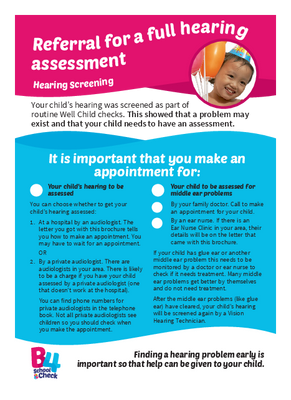Referral for a Full Assessment (B4 School Hearing Screening) - English version - HE2277

Information in English for hearing technicians to give to parents and caregivers, when screening carried out as part of routine Well Child health checks indicates the need for further assessment.
The full resource:
Hearing Screening
Your child’s hearing was screened as part of routine Well Child checks. This showed that a problem may exist and that your child needs to have an assessment.
It is important that you make an appointment for:
□ Your child’s hearing to be assessed
You can choose whether to get your child’s hearing assessed:
- At a hospital by an audiologist. The letter you got with this brochure tells you how to make an appointment. You may have to wait for an appointment.
OR
- By a private audiologist. There are audiologists in your area. There is likely to be a charge if you have your child assessed by a private audiologist (one that doesn’t work at the hospital). You can find phone numbers for private audiologists in the telephone book. Not all private audiologists see children so you should check when you make the appointment.
□ Your child to be assessed for middle ear problems
- By your family doctor. Call to make an appointment for your child.
- By an ear nurse. If there is an Ear Nurse Clinic in your area, their details will be on the letter that came with this brochure.
If your child has glue ear or another middle ear problem this needs to be monitored by a doctor or ear nurse to check if it needs treatment. Many middle ear problems get better by themselves and do not need treatment.
After the middle ear problems (like glue ear) have cleared, your child’s hearing will be screened again by a Vision Hearing Technician.
Finding a hearing problem early is important so that help can be given to your child.
About the assessment...
The assessment
You can ask when you make the appointment how long it will take. The tests done in the assessment are safe for your child. You will get the result of the assessment at the end.
Although you are welcome to bring other family members to the appointment, it makes the testing run more smoothly if there are no distractions for your child while the tests are being done.
What if the assessment shows my child has a hearing problem?
You will get information about the help available for your child. If your child needs further help, this will be paid for by the government. You and the person who does the assessment can plan what you would like to do next.
What if the assessment shows my child has good hearing?
Even though your child was referred from the hearing screen, the more detailed testing may find no important problems. Some children may develop a hearing problem later though so it is important you visit your family doctor if you think your child might have a hearing problem later on.
Your rights
It is important that you have enough information following the hearing screen to help you decide whether you want your child referred for a full assessment. You may also want to discuss it with your partner, family or whānau. Even if your child passes this full assessment, hearing problems can still develop later.
For further information about children’s hearing screening, or to download this brochure, visit the Ministry of Health website or call the free 24-hour health advice service, Healthline on (0800 611 116).
For more information
Contact the Vision Hearing Technician who screened your child. They can advise you on getting an appointment for your child. Or talk an audiologist, ear nurse or your family’s doctor. You can also ring Healthline (0800 611 116) for free 24-hour health